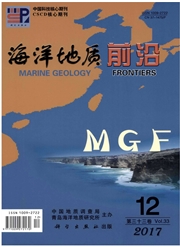

 中文摘要:
中文摘要:
环北极深水盆地群油气资源丰富,资源量达2 200亿桶油当量,但总体勘探程度较低,是未来深水油气勘探开发重要的战略接替区。对环北极深水盆地群中巴伦支海盆地、东格陵兰盆地、北极斜坡盆地和斯沃特里普盆地4个含油气盆地做了详细调研,得出以下结论:环北极深水区油气主要富集在中生界,本区共发育有三叠系、中—上侏罗统泥页岩2套区域性主力烃源岩和上二叠统、下侏罗统和白垩系泥页岩3套局部主力烃源岩;发育二叠系、三叠系、侏罗系和白垩系砂岩4套储集岩;发育三叠系、侏罗系和白垩系页岩3套盖层。根据生储盖组合的沉积环境及主力烃源岩及储层所处的构造期次得出本区的主力生储盖组合为裂谷期海生海储海盖型生储盖组合,主要圈闭类型为构造圈闭。
 英文摘要:
英文摘要:
It is estimated that oil and gas resources may amount to 220 billion Bboe in the Circum-Arctic deep basins.But it is poor in exploration in general.There are many places with strategic significance for future oil and gas exploration and development.This paper selected the Barents Sea Basin,East Greenland Basin,Arctic Slope basin and Sverdrup basin from the circum-Arctic deep basins as cases to study their oil and gas potential.It is concluded that oil and gas are mainly accumulated in the Mesozoic.There are two main regional hydrocarbon source rocks,i.e.the Triassic shale,and the middle-upper Jurassic shale,and three local hydrocarbon source rocks,i.e.the upper Permian shale,lower Jurassic shale,and Cretaceous shale.The Permian,Triassic,Jurassic and Cretaceous sandstones are major reservoirs.The Triassic,Jurassic and Cretaceous shales are good in quality as seals.It is suggested that this region is characterized by a marine source-reservoir-seal system formed in rifting stages with structural trap as a major type for oil and gas accumulation.
 同期刊论文项目
同期刊论文项目
 同项目期刊论文
同项目期刊论文
 期刊信息
期刊信息
